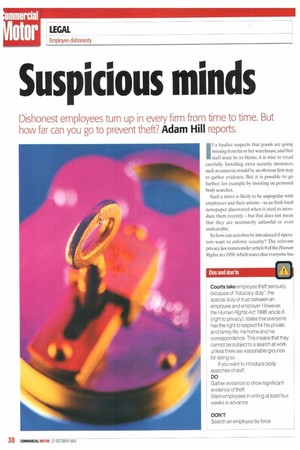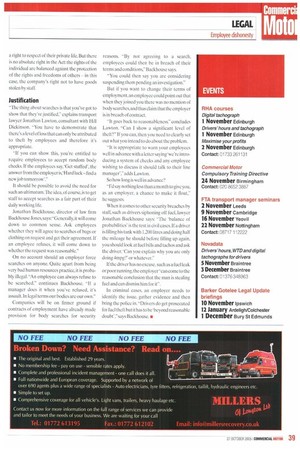Suspicious minds
Page 40

Page 41

If you've noticed an error in this article please click here to report it so we can fix it.
Dishonest employees turn up in every firm from time to time. But how far can you go to prevent theft? Adam Hill reports.
If a haulier suspects that goods are going missing from his or her warehouse, and that staff must be to blame, it is wise to tread carefully. Installing extra security measures, such as cameras, would be an obvious first step to gather evidence. But it is possible to go further, for example by insisting on personal body searches.
Such a move is likely to be unpopular with employees and their unions — as an Irish local newspaper discovered when it tried to introduce them recently — but that does not mean that they are necessarily unlawful or even undesirable.
So how can searches be introduced if operators want to enforce security? The relevant privacy law comes under article 8 of the Human Rights Act 1998, which states that everyone has a right to respect of their private life. But there is no absolute right in the Act: the rights of the individual are balanced against the protection of the rights and freedoms of others — in this case, the company's right not to have goods stolen by staff.
Justification Ilie thing about searches is that you've got to show that they're justified," explains transport lawyer Jonathan Lawton, consultant with Hill Dickinson. -You have to demonstrate that there's a level of loss that can only be attributed to theft by employees and therefore it's appropriate.
-If you can show this, you're entitled to require employees to accept random body checks. If the employees say, 'Get stuffed', the answer from the employer is,'Hard luck —find a new job tomorrow7 It should be possible to avoid the need for such an ultimatum.The idea, of course, is to get staff to accept searches as a fair part of their daily working life.
Jonathan Backhouse, director of law firm Backhouse Jones, says:"Generally, it will come down to common sense. Ask employees whether they will agree to searches of bags or clothing on request and get their agreement. If an employee refuses, it will come down to whether the request was reasonable."
On no account should an employer force searches on anyone. Quite apart from being very bad human resources practice, it is probably illegal. -An employee can always refuse to be searched," continues Backhouse. "If a manager does it when you've refused, it's assault. In legal terms our bodies are our own."
Companies will be on firmer ground if contracts of employment have already made provision for body searches for security reasons. "By not agreeing to a search, employees could then be in breach of their terms and conditions," Backhouse says.
"You could then say you are considering suspending them pending an investigation."
But if you want to change their terms of employment, an employee could point out that when they joined you there was no mention of body searches,and thus claim that the employer is in breach of contract.
-It goes back to reasonableness," concludes Lawton. "Can I show a significant level of theft?" If you can, then you need to clearly set out what you intend to do about the problem.
"It is appropriate to warn your employees well in advance with a letter saying'we're introducing a system of checks and any employee wishing to discuss it should talk to their line manager'," adds Lawton.
So how long is well in advance'?
"I'd say nothing less than a month to give you, as an employer, a chance to make it float," he suggests.
When it comes to other security breaches by staff, such as drivers siphoning off fuel, lawyer Jonathan Backhouse says: "The 'balance of probabilities' is the test in civil cases. If a driver is filling his tank with 1.2013 litres and doing half the mileage he should before filling up again, you should look at fuel bills and tachos and ask the driver, 'Can you explain why you are only doing 4mpg?' or whatever."
If the driver has no excuse. such as a fuel leak or poor running,the employer "can come to the reasonable conclusion that the man is stealing fuel and can dismiss him for it".
In criminal cases, an employer needs to identify the issue, gather evidence and then bring the police in. "Drivers do get prosecuted for fuel theft but it has to be 'beyond reasonable doubt'." says Back house. •










































































































































































































